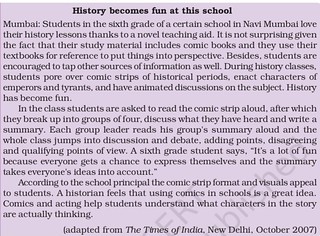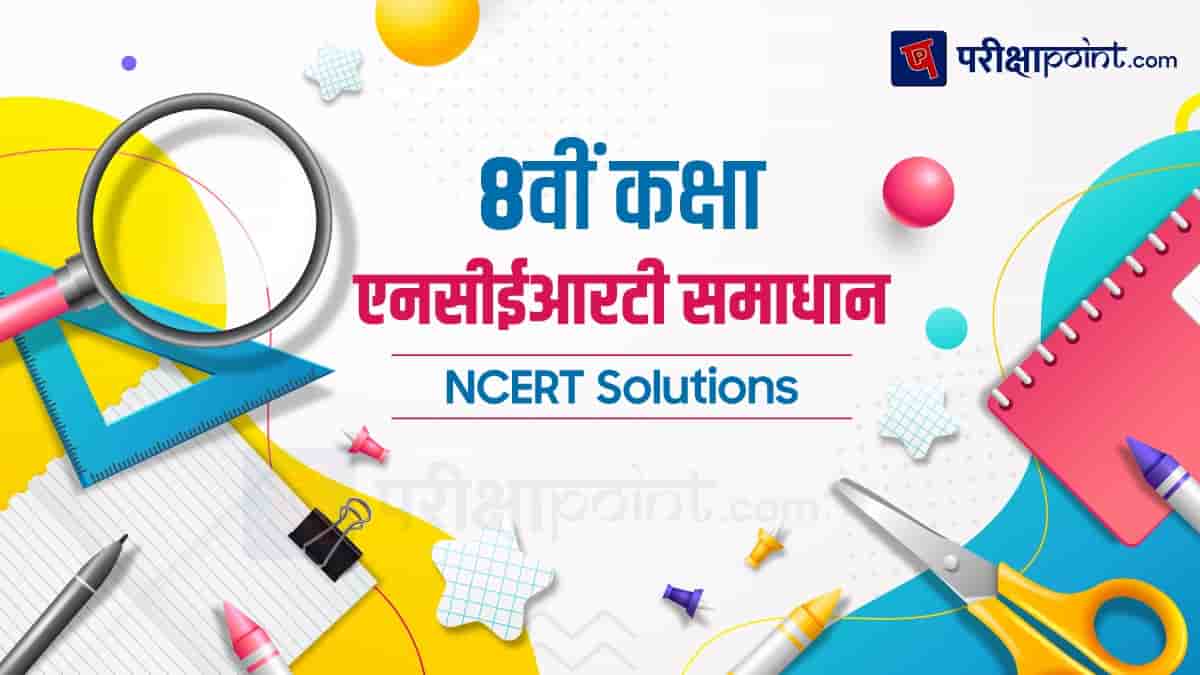Students can get through this article NCERT Solutions Class 8 English honeydew Chapter 3 Glimpses of the Past. Complete solution of honeydew class 8 lesson 3 is given in this article. class 8 English book honeydew question answer is completely free. Students can prepare for the examination in a better way with the help of question answers for class 8 English chapter 3. Let us then see below the Ncert solutions for class 8 English honeydew chapter 3 Glimpses of the Past.
NCERT Solutions Class 8 English honeydew Chapter 3 Glimpses of the Past
The purpose of NCERT solutions for class 8 English honeydew is only to give good education. NCERT Solutions Class 8 English honeydew Chapter 3 Glimpses of the Past prepared with the help of National Council of Educational Research and Training. The question answers of class 8th English book NCERT are designed keeping in mind the CBSE syllabus. Check out the NCERT solutions for 8th class English book lessons from below.
Class : 8
Subject : English honeydew
Chapter : 3 Glimpses of the Past
Comprehension check:-
Qus 1. Look at picture 1 and recall the opening lines of the original song in Hindi, Who is the singer ? Who else do you see in this picture ?
Ans. The opening lines of the original Hindi song are ‘Aye mere vatan ke logon, Zara aankh me bharlo paani, Jo shaheed huye hai unki zara yaad kro kurbaani …” Lata Mangeshkar is the singer. Pandit Jawahar Lal Nehru, Indira Gandhi, Lal Bhadur Shastri are seen in the picture.
Qus 2. In picture 2 what do you understand by the Company’s “superior weapons”?
Ans. The Company’s was technologically far superior than Indian Princes. The Englishmen have better quality and advanced weapons that attracts the Indian Prices, who were constantly in the war. To win the war, Indian princes seeking help from the Englishmen. These internal rivalries help the Company’s to gain control all over the India. So, the Company’s superior weapons refers to their diplomacy and the guns.
Qus 3. Who is an artisan ? Why do you think the artisans suffered ? (picture 3)
Ans. The artisans are the skilled worker, who make handmade decorative or functional goods. The Company wants to sell their machine-manufactured goods in India, so they extracting huge tax from the artisans. In this way, Englishman ruined artisans economically and also ruined their business of hand-made goods.
Qus 4. Which picture, according to you, reveals the first sparks of the fire of revolt ?
Ans. Picture 7 “The Sparks” reveals the first sparks of the fire of revolt.
Working with the text:-
Answer the following questions.
Qus 1. Do you think the Indian princes were short-sighted in their approach to the events of 1757 ?
Ans. Yes, in their approach to the events of 1757, the Indian princess were short – sighted. The company adopted the “Divide and Rule Policy”. Englishmen doesn’t want peace among the Indian Princes. They always seek help from the Company to defeat their rivals. This shows that the Indian Princes are short-sighted, they didn’t think about the long term consequences.
Qus 2. How did the East India Company subdue the Indian princes ?
Ans. The East India Company adopted the “Divide and Rule Policy”. They take advantages of tensions among the Indian Princes. They helped them in their fights with their rivals. When they became weak the Company killed them or dethroned them. That’s how the East India Company subdue the Indian Princes one by one.
Qus 3. Quote the words used by Ram Mohan Roy to say that every religion teaches the same principles.
Ans. Ram Mohan Roy said, “Cows are of different colour but the colour of their milk is the same. Different teachers have different opinions but the essence of every religion is the same.”
Qus 4. In what ways did the British officers exploit Indians ?
Ans. They imposed heavy taxes on Indian farmers. They reduced import duty on the goods manufactured in England and imported to India. They gave very little salaries to the Indians in comparison to their British counterparts.
Qus 5. Name these people.
(i) The ruler who fought pitched battles against the British and died fighting.
(ii) The person who wanted to reform the society.
(iii) The person who recommended the introduction of English education in India.
(iv) Two popular leaders who led the revolt (Choices may vary.)
Ans. (i) Tipu Sultan
(ii) Ram Mohan Roy
(iii) Lord Macaulay
(iv) Nana Saheb and Kunwar Singh
Qus 6. Mention the following.
(i) Two examples of social practices prevailing then.
(ii) Two oppressive policies of the British.
(iii) Two ways in which common people suffered.
(iv) Four reasons for the discontent that led to the 1857 War of Independence.
Ans. (i) Untouchability , child marriage
(ii) To put the Indians in jails without trial in a court, heavy taxes on farmers.
(iii) Due to the wrong policies of the company, famines between 1822 to 1836 took fifteen lakh lives.
The artisans were ruined due to the oppressing policies of the British.
(iv) Indian soldiers get a pittance and slow promotion in comparison to their British counterparts.
The British asked the Indians to cross the sea which was against their religion.
The use of grease made from the fat of cows and pigs on the bullets angered the Indian soldiers.
The British had annexed many kingdoms.
Working with language
In comics what the characters speak is put in bubbles. This is direct narration. When we report what the characters speak, we use the method of indirect narration.
Study these examples.
First farmer. Why are your men taking away the entire crop?
Second farmer: Your men have taken away everything.
Officer: You are still in arrears. If you don’t pay tax next week, I’ll send you to jail.
- The first farmer asked the officer why his men were taking away the entire crop.
- The second farmer said that their men had taken away everything.
- The officer replied that they were still in arrears and warned them that if they did not pay tax the following week, he (the officer) would send them (the farmers) to jail.
1 . Change the following sentences into indirect speech.
(First man: We must educate our brothers.
Second man : And try to improve their material conditions.
Third man : For that we must convey our grievances to the British Parliament.
The first man said that _________________________
___________________________________________
The second man added that _____________________
____________________________________________
The third man suggested that ___________________
____________________________________________
(ii) First soldier: The white soldier gets huge pay, mansions and servants.
Second soldier : We get a pittance and slow promotions.
Third soldier: Who are the British to abolish our customs?
The first soldier said that ___________________________
______________________________________________
The second soldier remarked that ____________________
______________________________________________
The third soldier asked ____________________________
_____________________________________________
Ans. (i) The first man said that they must educate their brothers.
The second man added that they must try to improve their material condition.
The third man suggested that they must convey their grievances to the British Parliament.
(ii) The first soldier said that the white soldiers got huge pay, mansions and servants.
The second soldier remarked that they got a pittance and slow promotions.
The third soldier asked who the British were to abolish their customs.
Speaking and writing :-
1 . Playact the role of farmers who have grievances against the policies of the government. Rewrite their ‘speech bubbles’ in dialogue form first.
Ans. First Farmer :- The Angrej has taken away all my crop.
Second Farmer :- The Angrej had put my brother in jail for not paying tax.
Third Farmer :- There has been a famine for the two years. How can we pay so heavy taxes?
Farmer Leader :- Unite yourselves. Revolt against their policies. Join the revolutionaries.
(ii) Write the story in your own words. Give it a title.
Ans. The Fox and the Goat
One day a fox fell accidentally into a well. She tried hard to get out of the well but in vain. After some time a goat came there. She saw the fox in the well. She asked the fox ,” What are you doing inside the well ?” The fox said,” I am enjoying the taste of sweet water .” The goat said ,” Let me taste it.” The fox asked the goat to jump into the well. The foolish goat jumped into the well. The fox climbed onto the goat and jumped out of the well. The foolish goat was left alone in the well. She learnt that she had been be fooled.
Moral :- Look before you leap.
3. Read the following news item.

Based on this news item, write a paragraph on what you think about this new method of teaching history.
Ans. History is generally considered a boring subject. Many students lose interest in this subject due to its lengthy and subjective topics. They are to cram dates and facts. But adopting this method of teaching history is really very interesting. It will create the interest of the students in the subject because they enjoy reading comics. The comical presentation of history will put a long lasting impression of facts in the minds of the students.
Check below all chapters of NCERT Solutions for Class 8 English honeydew
Students must have been very happy to get NCERT Solutions Class 8 English honeydew Chapter 3 Glimpses of the Past. It is our endeavor to give better knowledge to the students. Also you can get NCERT Solutions and NCERT Books in Hindi from NCERT page of parikshapoint.com.
| To the main page of this article | click here |



The answers to the questions are explained in a very concise and very easy way.
thank you